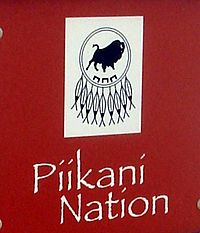Piikani Nation facts for kids
 |
|
| People | Blackfoot |
|---|---|
| Treaty | Treaty 7 |
| Headquarters | Brocket |
| Province | Alberta |
| Land | |
| Main reserve | Piikani 147 |
| Other reserve(s) | |
| Land area | 456.778 km2 |
| Population (2019) | |
| On reserve | 2451 |
| Off reserve | 1466 |
| Total population | 3917 |
| Government | |
| Chief | Stanley Grier |
| Website | |
| piikanination.wixsite.com | |
The Piikani Nation (/pɪˈkɑːni/), also known as the Peigan, is a First Nation in Alberta, Canada. They are part of the larger Indigenous people group known as the Northern Piikani (Blackfoot: Aapátohsipikáni). The Piikani Nation is one of the groups that make up the Blackfoot Confederacy.
History of the Piikani Nation
Historically, the Piikani people spoke the Blackfoot language. They were part of the Blackfoot Confederacy (Niitsítapi). Before the 1870s, their traditional lands stretched across what is now the Canada–United States border.
Treaties and Land Agreements
The Blackfoot Confederacy signed agreements, called treaties, with the United States government. They received a large area of land in what is now Montana. However, after a difficult event with the US Army in 1870, American officials pressured the Blackfoot to give up more and more land to settlers. This led some Piikani people to move to Canada. In 1877, they signed Treaty 7 with the Canadian government.
Northern and Southern Piikani
Today, the Piikani people are divided into two main groups. The Blackfeet Nation (Aamsskáápipikani), or "Southern Piikani," live on the Blackfeet Indian Reservation in Montana. The Piikani Nation (Aapátohsipikáni), or "Northern Piikani," live in Alberta, Canada.
Blackfoot Confederacy Members
Besides the Piikani, the Blackfoot Confederacy also includes other Blackfoot-speaking groups. These are the Káínaa (Blood) and the Siksiká (Blackfoot). The Tsuu T'ina (Sarcee) also became allies later, though they speak a different language. When the treaties were signed, the Northern Piikani lived along the Oldman River in Alberta, west of Lethbridge.
Piikani Nation Today
The Piikani Nation's main office is in Brocket, Alberta. They manage two areas of land: Peigan Timber Limit "B" and the Piikani 147 Indian reserve. Brocket is located on the Piikani 147 reserve. As of 2014, the Piikani Nation had 3,638 registered members. About 2,358 of these members lived on the Piikani Nation reserves. The Nation is also a member of the Treaty 7 Management Corporation.
Piikani Nation's Achievements
The Piikani Nation has a history of being pioneers. They were the first First Nation in Alberta to ask for the right to vote in provincial elections. They were also the first to allow alcohol on their reserve. Additionally, they were the first to take control of managing their own reserve. They were also the first to host "Indian Day Celebrations." These celebrations help them keep their culture strong.
Education and Learning
The Piikani Nation has managed its own education system since 1986. That year, a high school was built on the reserve. The Peigan Board of Education oversees this. It is a non-profit group with six elected members and one appointed by the band council. The Piikani Youth & Education Foundation helps students with scholarships. This support comes from the Piikani Trust Agreement.
How the Piikani Nation is Governed
The Piikani Nation is led by a council. This council includes a chief and twelve councilors. They are chosen based on the Nation's own customs, not just the rules of the Indian Act. In 2002, the Piikani Nation created its own "Election Code." This code mentions Piikanissini, which are the traditional teachings of the Piikani people. It even allows councilors to be removed if they do not follow these important teachings.
Role of Elders and Traditional Teachings
In a court case in 2008, the principles of Piikanissini were discussed. The court recognized that the elders in the community act like advisors. They are important in guiding the Piikani Nation's election process. The court ruled that the Election Code needed to be clearer about the elders' role. This shows how important traditional teachings are in the Piikani Nation's governance. Leaders are expected to uphold the standards of conduct set by these teachings.
Water Rights and Land Acquisition
In 2002, the Piikani Nation reached an agreement with the governments of Alberta and Canada. This agreement was about their water rights, which were affected by the Lethbridge Northern Irrigation Headworks on the Oldman River. The settlement was for C$64.3 million. This money was put into the Piikani Trust. The agreement also allowed the Nation to gain about 10,300 acres of new reserve land.
 | Anna J. Cooper |
 | Mary McLeod Bethune |
 | Lillie Mae Bradford |

